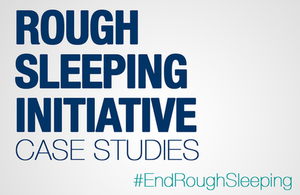Greater London Authority: Floating hubs
Find out how funding from the Rough Sleeping Initiative helped H overcome her substance misuse and find accommodation.

Rough Sleeping Initiative
About the hubs
Commissioned by the Greater London Authority, St Mungo’s floating hubs are an extension of the ‘No Second Night Out’ service, designed as an emergency response for those sleeping rough with time critical assessment centres that address specific local needs.
The aim of each hub is to provide access to short term support to address immediate needs and provide a safe space to stay. People are supported inside, rapidly assessed and an action plan is drawn up with them. The use of the hub enables the team to bring vital services together under one roof for short periods of intensive activity in problematic areas, or to areas currently lacking in service provision. The resulting individual action plans for people will continue to be worked on by agreed lead agencies after the hub has closed.
The individual
H is a woman who had a history of rough sleeping as far back as 2003 and who was very well known to outreach services in her local area. She had a long history of substance misuses and had been through a range of different services who had tried to assist her into accommodation but ultimately, she had declined.
The issue
One of the key reasons why H had previously declined accommodation offers was because her partner, P, was also sleeping rough and she didn’t want to leave him on the street alone.
What was done?
Through the floating hub service, H was assisted in accessing substance abuse support and was provided accommodation at one of St Mungo’s staging posts. A place was also found for P at a local backpacker facility and he was also provided with substance abuse support while being helped to find work.
The result
H has stayed in her accommodation and is being helped to find private rented accommodation in London, where she hopes P will also be able to stay.
How the government is tackling rough sleeping
The rough sleeping initiative is a cross-government plan of action to significantly reduce the number of people sleeping rough. This is backed by a targeted £75 million fund for local authorities with high levels of rough sleeping to use in 2018 to 2020.
Alongside this, the government’s rough sleeping strategy and its supporting delivery plan lay out plans both to help people who are sleeping rough now, and to put in place the structures needed to end rough sleeping for good.
On 1 October 2018 the Homeless Reduction Act 2017’s duty to refer came into force. The duty to refer means that certain named public bodies must refer users of their service who they have reason to believe are – or are at risk of soon becoming – homeless, to a local authority of the service users’ choice.